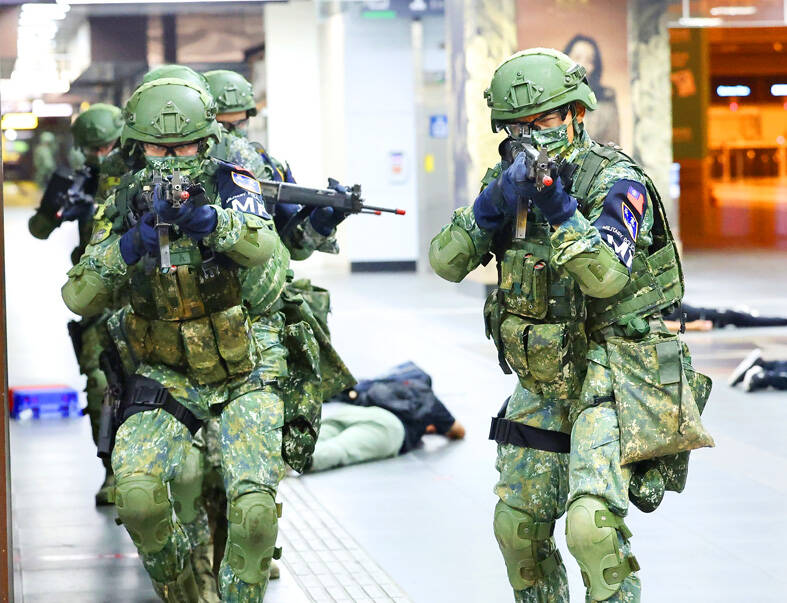To enhance the defense of the capital, the Ministry of National Defense on Wednesday confirmed a plan to station an additional military police battalion in Taipei, and to gradually double its ranks to 10,000 when the extension of the military conscription period comes into effect tomorrow, a source said.
The new unit would be the sixth battalion stationed in the capital under the 202nd Military Police Command, which has set new yearly recruitment targets to incrementally increase the nation’s military police to 10,000, from 5,000, said an official at the ministry, who spoke on condition of anonymity.
The approved plan would garrison the new military police unit in Taipei’s south sector, tasked with safeguarding key infrastructure and strategic facilities, and to counter a “decapitation tactic” by China, a possible strategy of mounting a rapid assault operation targeting government leaders in the initial stages of an invasion of Taiwan, the source said.

Photo: CNA
Taipei’s north and south sectors are divided by the Keelung River (基隆河), and a military assessment pointed to the need to bolster military police battalions in the south, the source said.
Ministry officials said China has escalated tensions and destabilized peace in the region, with frequent incursions into Taiwan’s sea and airspace by its warships and aircraft.
Therefore, Taiwan must prepare to be able to defend itself against an attack, and so the ministry has endorsed several arms procurement packages in the past few years to bolster combat readiness, while undertaking reforms and upgrading training programs for all armed forces branches.
The source said that the ministry’s report in October showed the army branch has stationed two infantry brigades (137th and 249th) in Taipei, along with two combat battalions for the defense of specific infrastructure, which are under the command of the Sixth and Eight Army Corps respectively.
The five military police units in Taipei include the 211st Battalion, which is tasked with the security around the Presidential Office Building; the 332nd Battalion, which is tasked with security at the official residences of the president and the vice president, while the 239th Battalion — which is the only armored combat unit among the five — is stationed in the Dazhi area (大直), and is tasked with guarding the ministry and military compounds in the area.
Taiwan has a different setup from other countries. The military police command is a separate branch of the armed forces and is tasked mainly with guarding the nation’s key facilities, protecting the personal safety of government leaders against hostile forces and conducting counterintelligence work against enemy infiltrators, spies and saboteurs.

An essay competition jointly organized by a local writing society and a publisher affiliated with the Chinese Communist Party (CCP) might have contravened the Act Governing Relations Between the People of the Taiwan Area and the Mainland Area (臺灣地區與大陸地區人民關係條例), the Mainland Affairs Council (MAC) said on Thursday. “In this case, the partner organization is clearly an agency under the CCP’s Fujian Provincial Committee,” MAC Deputy Minister and spokesperson Liang Wen-chieh (梁文傑) said at a news briefing in Taipei. “It also involves bringing Taiwanese students to China with all-expenses-paid arrangements to attend award ceremonies and camps,” Liang said. Those two “characteristics” are typically sufficient

A magnitude 5.9 earthquake that struck about 33km off the coast of Hualien City was the "main shock" in a series of quakes in the area, with aftershocks expected over the next three days, the Central Weather Administration (CWA) said yesterday. Prior to the magnitude 5.9 quake shaking most of Taiwan at 6:53pm yesterday, six other earthquakes stronger than a magnitude of 4, starting with a magnitude 5.5 quake at 6:09pm, occurred in the area. CWA Seismological Center Director Wu Chien-fu (吳健富) confirmed that the quakes were all part of the same series and that the magnitude 5.5 temblor was

The brilliant blue waters, thick foliage and bucolic atmosphere on this seemingly idyllic archipelago deep in the Pacific Ocean belie the key role it now plays in a titanic geopolitical struggle. Palau is again on the front line as China, and the US and its allies prepare their forces in an intensifying contest for control over the Asia-Pacific region. The democratic nation of just 17,000 people hosts US-controlled airstrips and soon-to-be-completed radar installations that the US military describes as “critical” to monitoring vast swathes of water and airspace. It is also a key piece of the second island chain, a string of

The Central Weather Administration has issued a heat alert for southeastern Taiwan, warning of temperatures as high as 36°C today, while alerting some coastal areas of strong winds later in the day. Kaohsiung’s Neimen District (內門) and Pingtung County’s Neipu Township (內埔) are under an orange heat alert, which warns of temperatures as high as 36°C for three consecutive days, the CWA said, citing southwest winds. The heat would also extend to Tainan’s Nansi (楠西) and Yujing (玉井) districts, as well as Pingtung’s Gaoshu (高樹), Yanpu (鹽埔) and Majia (瑪家) townships, it said, forecasting highs of up to 36°C in those areas